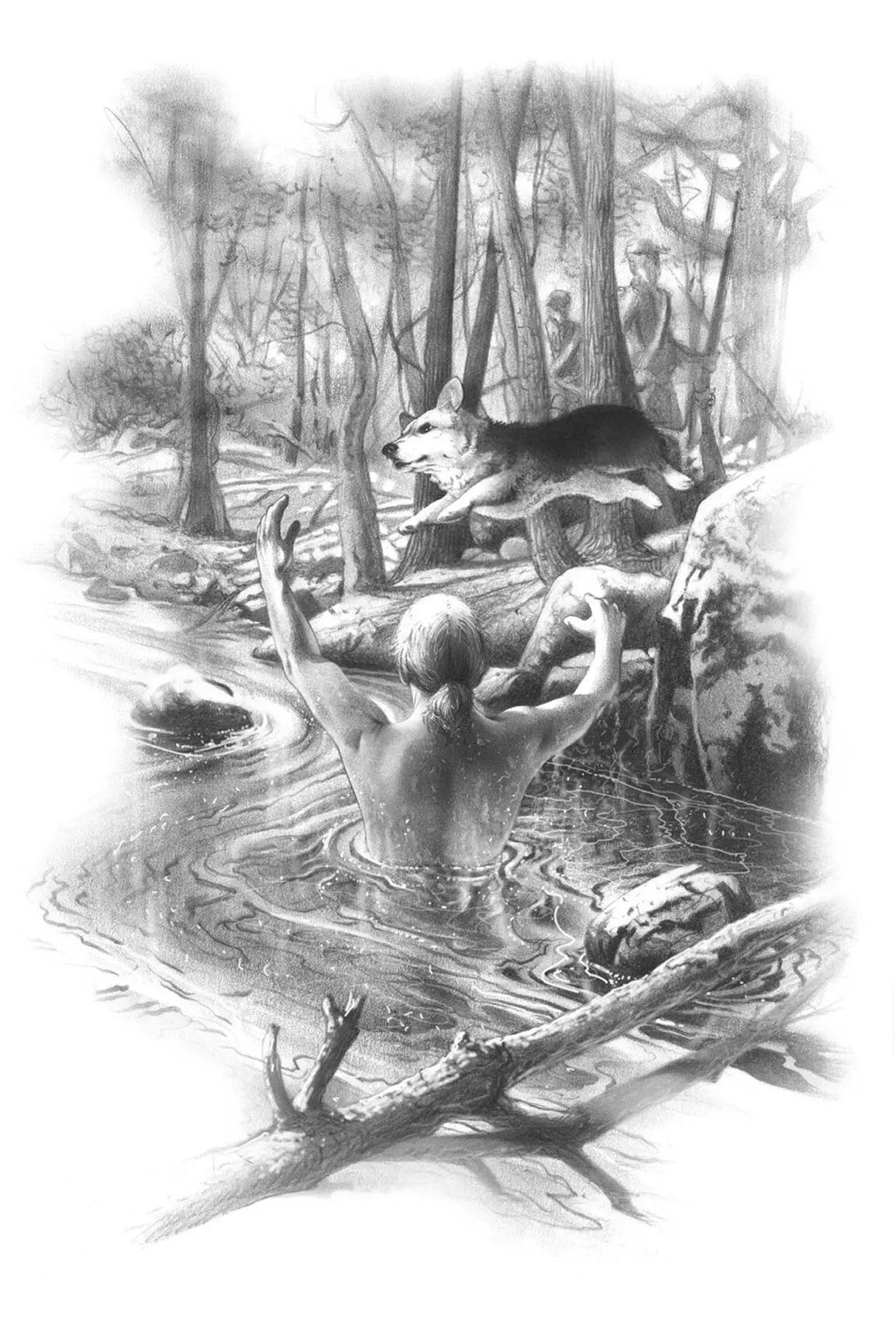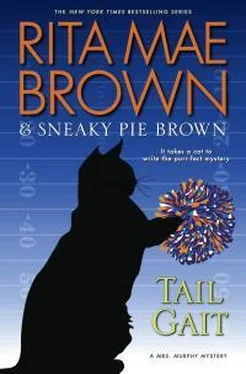As Cooper drove off, Harry said out loud, “Maybe it’s better to die a swift death than to linger with some horrible malady.” Then she caught herself. “How can I even think that about Ginger?”
“Needless suffering is cruel,” Tucker remarked. “Think of those deer and bear who are wounded, and it takes them days or weeks to die. That’s cruel. You’ve got to finish off your game.”
“I hardly think a professor emeritus of history is fair game,” Mrs. Murphy drily noted.

November 12, 1779
Each day at march’s end or when the prisoners were allowed a brief respite from marching, Lieutenant Charles West would pull out a notebook and draw a farmhouse, a meandering creek, rock outcroppings, the roll of a hill or the shape of a tree. These things interested him, but he also wanted to forever remember this march. Over the last year many captured soldiers had made this journey. Leaving a week ago, West’s group of veterans from the Battle of Saratoga was one of the last to leave Cambridge, Massachusetts. Outranked in his group by a Captain Graves from the Royal Irish Artillery as well as by a Hessian dragoon captain, West thought Graves a prophetic name for a dragoon.
Charles marched with his surviving four marksmen, and by the time they reached a large camp, a palisade thrown up west of the King’s Highway, he was grateful to stop. How far west? He guessed a day’s march. Merely a young lieutenant, and not of an elite unit, Charles was quiet and cooperative. The other captured officers outranked him, and quickly established their chain of command.
As the second son of an impoverished baron, Charles had been lucky his father had prevailed upon old friends to push his career forward. His father had borrowed to scrape together £450 to purchase Charles’s lieutenancy. A good education and this army commission were his inheritance. His other paternal gift, the expensive flintlock pistol, remained in Captain John Schuyler’s belt. Whatever Charles got in this life he would have to get on his own after his paternal send-off. He would rise through competence and bravery—if he survived this ordeal.
The young man’s talents lay in drawing, possibly in architecture, but the army it was, and he did as he was told. Charles had found he liked the non-officers. He also liked a few of the junior officers, young men like himself or older men who had made a name for themselves in the Colonies in the recent French and Indian Wars. Men who had proven themselves in battle were worth more to him than a rich scion colonel. He wound up in Fraser’s regiment with the marksmen because of his good, artistic eye. Charles could read terrain, and terrain in this New World proved demanding.
On a good day, the marching prisoners might cover fifteen miles. Usually it was ten, slowed by wagons and pack animals and those who, from fatigue or wounds, needed to be left in whatever care could be found. Piglet tacked along besides Charles, an indefatigable companion. He noted that they were moving southwest. Sometimes directly south, sometimes west, but ultimately southwest. Since the British, as far as he knew, still held New York Port, this made sense.
The Continentals followed streams and wagon roads moving away from the coast. To the west lay greater security. Conditions improved inland. Once they were even able to bathe in a deep creek while being guarded. The cold and clear water invigorated the well-built lieutenant. Other prisoners and even the guards laughed when Piglet took a flying leap into the creek to be with Charles, who then bathed him too.

As the prisoners pieced together their experiences at Bemis Heights, a few facts asserted themselves. The colonial Loyalist population did not rise up to help them, nor did they sabotage the Continentals. And they fought blind. For whatever reason, the British invading force had lost its eyes, their Indian allies. None of the British on the march knew how many of their countrymen had died, but their losses were heavy enough. Those in the infantry on the field and on the rises said when they withdrew, the dead had covered the ground. Splashes of Redcoats and blood, blood everywhere.
Those captured on the day following Charles’s capture, October 8, verified that General Burgoyne had retreated east of Saratoga, but they did not know where he’d gone. Some assumed he had kept going, others that he had returned to camp, others that he awaited reinforcements to again give battle.
Captain Graves growled that the general should have retreated to Albany, where the lines to Canada would be better. From that direction help might yet arrive. The Irishman made it no secret that he thought good men had been badly led. Higher ranking men ignored Graves. He was Irish, and they held that against him too.
Charles thought to himself that if the Canadian commander had wished to send troops, he would have done so before Saratoga, but he kept his mouth shut. That was a lesson he had learned early. Better to wait to be asked. And who would ask a nineteen-year-old lieutenant?
The sun was setting. Dappled light shone in meadows, and long slanting rays shafted through the endless forests bordering the rutted wagon trail. The frosts seemed to arrive the instant the sun set. If not in a camp, they slept on the ground without blankets. No man there had been able to retrieve gear, and the Continentals didn’t have enough for themselves. Many of the marchers actually looked forward to being in a prison camp, for they would finally have a roof over their heads or at least some cover, and probably better food than they had on the march. Still, they were treated decently.
Hoofbeats alerted them. Calls came from behind. A messenger rode alongside and then surged forward to Captain Schuyler. The column stopped, men dropped to sit by the side of the road, glad for a breather. Charles noted that the messenger was a major and wore a full Continental uniform. He was on his way to becoming a ranking officer; deportment mattered. After a few words with Schuyler, the major trotted off. Charles noted that the horse was fit. Forage in this land was easy to find and good for the rebels.
Back on the road, the silver evening star rose large and luminous. With relief, they marched into a fort. Temporary but not badly built huts would provide shelter from the frost. As the prisoners were directed into the dwellings, each exhausted man dropped onto a bed, ropes sagging underneath straw mattresses.
Fresh bread and cheese appeared. The farmers and carters were eager for money. The prisoners as well as the men normally assigned to this small makeshift camp pumped a bit of money into local pockets.
Captain John Schuyler walked into Charles’s hut, and Charles noted that his captor always wore the flintlock he’d taken from him. While it might be the fortune of war to Schuyler, Charles wanted it back. “You learned while imprisoned at Cambridge that General Burgoyne surrendered his army to General Gates October seventeenth, shortly after the Battle of Saratoga,” Schuyler informed the British soldiers. “The terms of the surrender were that troops will be sent back to Europe after parole if each man promises not to again fight here.”
A silence greeted this announcement until a Hessian corporal, Karl Ix, asked, “Us too, right?”
“Those of you from Hesse will be exchanged for our men. I think, gentlemen, those are favorable terms. However, the major just told me your king is dragging his feet. He doesn’t want to negotiate with those he considers traitors. It’s all still dragging on.” With that, Schuyler left. The twelve men in the hut waited until they no longer heard Schuyler’s footfalls, then all spoke at once. Though the Battle of Saratoga was nearly two years before, the prisoners were still putting together the pieces as more information became known.
Читать дальше














